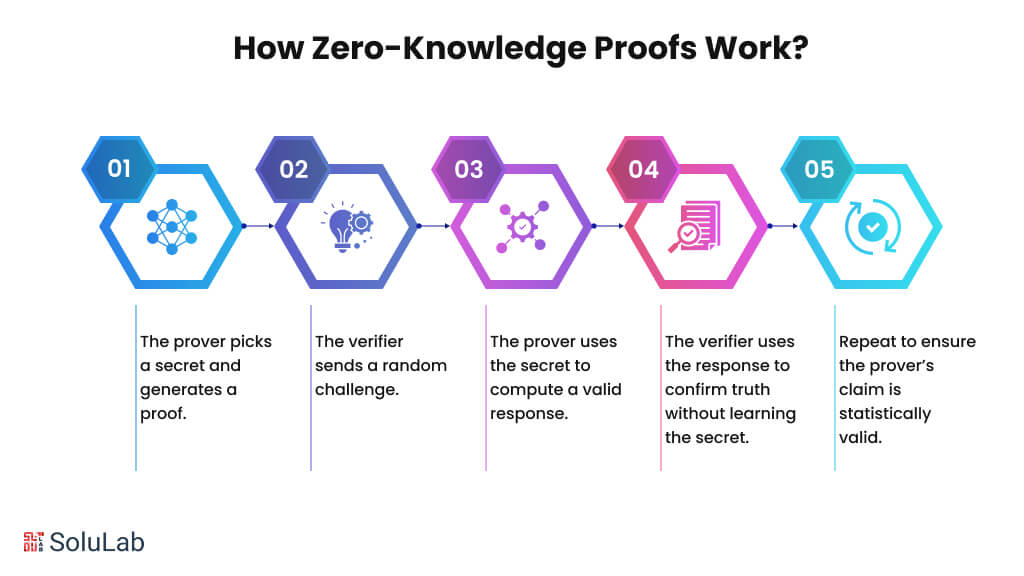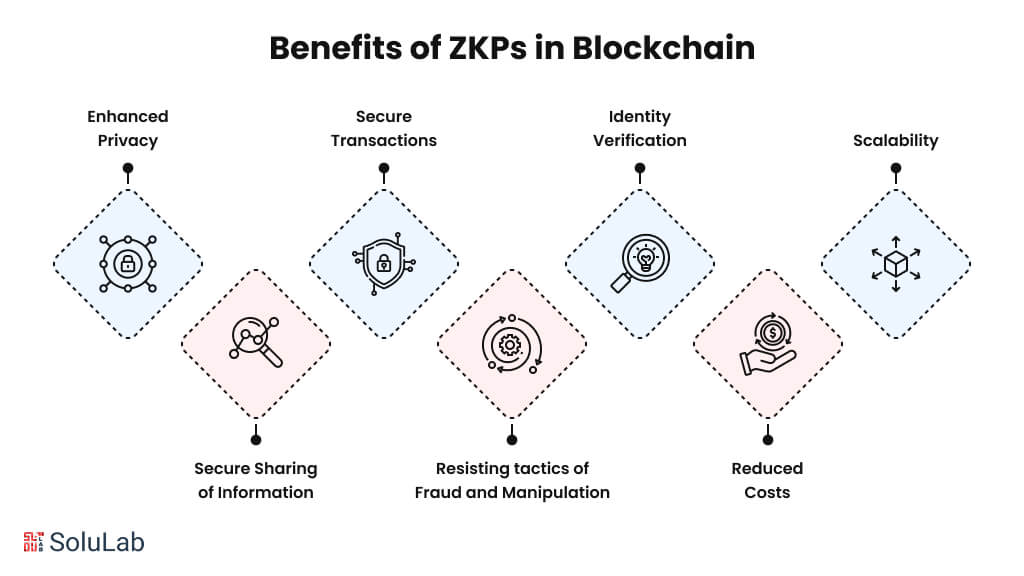Ever wondered how blockchain can be both transparent and private at the same time? That’s where Zero-Knowledge (ZK) proofs.
Whether it’s verifying your identity, voting online, or processing financial transactions, data privacy is a serious concern. Platforms like zkSync have seen rapid growth, with over 5 million addresses created and approximately 300,000 daily active users within eight months of launch
Here’s where zero-knowledge proofs flip the script. They let one party prove to another that something is true, without revealing what that something is. Sounds like magic? It’s not. It’s cryptographic brilliance.
In this blog, we’ll break down ZK proofs, explain how they work in blockchain, and explore how this technology is transforming sectors like finance, healthcare, and identity management, without overwhelming you with jargon.
What Is a Zero-Knowledge Proof in Blockchain?
A Zero-Knowledge Proof blockchain (ZKP) is a clever cryptographic technique that lets you prove something is true, without actually revealing the details behind it. They’re especially useful in Web3 and blockchain systems for boosting privacy and security.
The zero-knowledge proof market is expected to generate $75 million in revenue by 2024, with projections exceeding $10 billion by 2030.
For example, you can prove you have enough crypto in your wallet to make a transaction without showing your full balance. It’s like saying, “Trust me, I’ve got it,” and the system believes you, without needing to peek into your wallet.
How Do Zero-Knowledge Proofs Work?

The prover and the verifier engage in a process of interaction to make ZKPs work. The purpose of the prover is to show the truth of a claim, like “I have enough money for this transaction,” without disclosing any private information. The verifier verifies the evidence without discovering anything other than that the statement is true.
To start the process, the prover must provide evidence (the witness) to back up their claim, such as proof of account balance ownership or resource access permissions. The verifier then challenges the assertion, comparing it to predetermined standards using cryptographic algorithms:
- Completeness: The verifier can verify the veracity of the prover’s assertion.
- Soundness: The verifier cannot be persuaded to accept a wrong assertion.
- Zero-knowledge: The verifier acquires no further information beyond the fact that the claim is true.
When the prover provides the proper proof in answer to the challenge, the verifier assesses the response. If all requirements are met, the verifier can verify the authenticity of the proof without ever having access to the private information that supports the claim. The finished proof is thereafter posted to the blockchain for final validation.
Types of Zero-Knowledge Proofs
Zero-knowledge proofs (ZKPs) are a cryptographic method used in many ZK blockchain solutions to validate data without revealing the data itself. Here’s a quick breakdown of the main types you’ll come across in:
1. Interactive Zero-Knowledge Proofs
This type involves a back-and-forth communication between the prover and verifier. It’s commonly used in real-time applications but can be less scalable, which is why most ZKP implementation services focus on more advanced alternatives.
2. Non-Interactive Zero-Knowledge Proofs (NIZK)
Unlike the interactive version, NIZKs require no communication after the initial proof is generated. They’re ideal for blockchains since they reduce overhead and are widely used in Zero-knowledge proof consulting for scalability-focused use cases.
3. zk-SNARKs (Succinct Non-Interactive Argument of Knowledge)
Zk-SNARKs are compact, fast, and perfect for lightweight ZK blockchain solutions. They’re widely adopted in privacy coins and dApps because they’re efficient to verify and don’t need ongoing interaction between parties.
4. zk-STARKs (Scalable Transparent Argument of Knowledge)
zk-STARKs offer better scalability and security without needing a trusted setup. Many modern Zero-knowledge blockchain platforms are shifting to zk-STARKs as they’re more transparent and easier to audit.
5. Bulletproofs
Used mostly for confidential transactions, Bulletproofs are efficient and don’t need trusted setups. Though not as fast as zk-SNARKs, they’re a solid option for auditability and trust minimization matters.
6. PLONK
PLONK is a universal SNARK that supports multiple circuits with a single trusted setup. It’s becoming popular for its flexibility and efficiency in handling complex blockchain computations.

How ZKPs are Applied to Blockchain Privacy?
In blockchain, ZKPs are used to hide transaction details like the sender, receiver, and amount transacted. Here’s how it works:
1. Hiding Transaction Details: Instead of directly revealing the transaction details on the blockchain, the sender creates a ZKP that proves the transaction is valid. This proof demonstrates that:
- The sender has enough funds to cover the transaction.
- The transaction is authorized by the sender (e.g., using a digital signature).
- The transaction adheres to the blockchain’s rules (e.g., the amount being sent is positive).
2. Verification on the Blockchain: The ZKP, rather than the transaction details themselves, is recorded on the blockchain. Miners or validators can then verify the proof without needing to know the specifics of the transaction. If the proof is valid, the transaction is accepted and added to the block.
3. Privacy Preservation: Because the actual transaction details are never exposed, observers cannot determine who sent funds to whom, or how much was sent. The blockchain only records the fact that a valid transaction occurred.
Benefits of Zero-Knowledge Proofs in Blockchain

More and more, people in Web3 are turning to Zero-Knowledge Proofs (ZKPs) to defend privacy and security. Here are some Benefits it offers to us:
1. Enhanced Privacy: You can verify a statement without giving away the details using ZKPs. This way, you can be sure your password or personal information is safe because it is not shared.
2. Secure Sharing of Information: ZKPs help to share data while hiding its real content securely. Therefore, businesses can collaborate easily without worrying about data breaches or privacy problems.
3. Secure Transactions: Consumers can verify their transactions with ZKPs without exposing the information involved. It makes sure that people’s financial transactions are kept private in industries like banking and DeFi.
4. Resisting tactics of Fraud and Manipulation: Since no sensitive data needs to be shown, ZKPs decrease the opportunities for data corruption, identity theft, or making the system seem less trustworthy.
5. Identity Verification: With ZKPs, people can confirm their identity while keeping private documents hidden. Users who want to stay private will appreciate it since you don’t need to give away your identity.
6. Reduced Costs: Because ZKPs do not require additional verifications or big audits, operating costs for businesses and platforms can be kept low.
7. Scalability: Because ZKPs are light, networks can handle more transactions and users smoothly, which increases the scalability of blockchain.
Applications of ZKP in Blockchain
Zero-knowledge proofs (ZKPs) are increasingly used in different sectors since they check data while protecting confidential details. These are some existing illustrations of how zero-knowledge proof technology is now being put to work.
- Healthcare Records: ZKPs let this information be shared privately, without revealing the whole medical history. Private data sharing is made possible, which makes it the best choice for blockchain identity solutions in healthcare.
- Mortgage Loans: Banks do not have to review the entire bank account of a borrower because ZKPs permit them to verify just the required aspects. This makes it simpler for loans to be approved and diminishes the possibility of leaking confidential financial information.
- Online Voting System: ZKPs ensure that voters hide their personal information and their vote preference, but can still verify their eligibility to vote and the results. Thanks to this, digital democracy becomes more transparent and trusted.
- Network Security and Using Authentication: Due to ZKPs, it is possible to check a user’s credentials during login without disclosing the password or security tokens. It provides a major benefit for businesses when it comes to secure authentication.
- Digital Signatures: It is possible to provide evidence that someone signed a document with a ZKP, without exposing the identity of the signer or the content, so enterprises can depend on ZKPs for blockchain security.

Conclusion
Zero-knowledge proofs might sound complex, but at their core, they offer a smart and secure way to verify information without revealing the actual data. From protecting healthcare records to enabling private voting systems, ZK proofs are already making a big impact.
As blockchain adoption grows, so will the use of this privacy-first tech. Whether you’re a developer, business leader, or just curious about blockchain, understanding ZK proofs gives you a glimpse into the future of secure digital interactions.
Partner with SoluLab, a leading blockchain development company in USA, to build privacy-first blockchain solutions using zero-knowledge proof technology tailored for your business.
FAQs
1. Why are ZKPs important for blockchain?
They add a layer of privacy by allowing verification without revealing sensitive information. This is key for secure transactions, identity protection, and regulatory compliance in blockchain.
2. What’s the difference between zk-SNARKs and zk-STARKs?
Both are types of ZKPs. zk-SNARKs are compact and efficient but require a trusted setup. Zk-STARKs are more transparent and scalable but may require more computational resources.
3. Are ZKPs secure?
Yes, ZKPs are designed to be mathematically secure. They prevent data leaks and unauthorized access while maintaining trust and transparency in blockchain systems.
4. How do ZKPs enhance privacy in crypto?
They allow users to prove they have funds or access rights without revealing wallet balances or identities, making crypto transactions more private and secure
5. Is zero-knowledge proof technology scalable?
It’s improving fast. Solutions like zk-rollups and zk-STARKs are making zero-knowledge proof technology more scalable and efficient, especially for high-volume blockchain networks.






